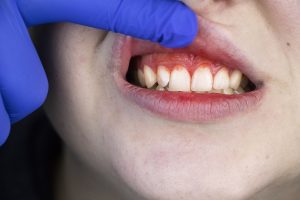 According to a new study published in the American Heart Association journal Hypertension, adults with gum disease may be at a higher risk of high blood pressure. The condition known as periodontitis is a severe gum infection that damages the soft tissue and destroys the bone that supports the teeth.
According to a new study published in the American Heart Association journal Hypertension, adults with gum disease may be at a higher risk of high blood pressure. The condition known as periodontitis is a severe gum infection that damages the soft tissue and destroys the bone that supports the teeth.
The study, which was in collaboration with the department of dentistry at the Universitat Internacional de Catalunya in Barcelona, Spain, included 250 adults with generalized, severe periodontitis (50% of teeth measured with gum infection). A control group of 250 adults who had no gum disease and were healthy with no chronic health conditions were also included. The median age of all participants was 35, and 52.6% were female.
Advertisement
All participants underwent periodontal examinations, which included gum disease severity measures such as bleeding of the gums, full-mouth dental plaque, and depth of the infected gum pockets.
Blood pressure was measured along with fasting blood, which was analyzed for high levels of white blood cells and high sensitivity C-reactive protein (hsCRP). These are both markers of increased inflammation in the body.
Additional information was analyzed, including a history of cardiovascular disease, body mass index, age, gender, ethnicity, smoking, and physical activity levels.
It was found that a diagnosis of gum disease was associated with a higher risk of hypertension, independent of cardiovascular risk factors. The participants with gum disease were twice as likely to have elevated systolic blood pressure values compared to people with healthy gums.
Bleeding gums were also associated with higher systolic blood pressure. These participants exhibited increased glucose, LDL cholesterol, and lower HDL cholesterol.
Author Francesco D’Aiuto, DMD, said, “This evidence indicates that periodontal bacteria cause damage to the gums and also triggers inflammatory responses that can impact the development of systemic diseases including hypertension. This would mean that the link between gum disease and elevated blood pressure occurs well before a patient develops high blood pressure. Our study also confirms that a worryingly high number of individuals are unaware of a possible diagnosis of hypertension.”
Limited Research
Advertisement
Previous research found an association between hypertension and periodontitis, but the associations’ details are scarce. By improving the information available to medical professionals, they can assess the risk factors for those with gum disease more accurately.
By integrating screening of hypertension by dental professionals, referrals can be made to primary care professionals. This could lead to early detection and treatment of both conditions to improve overall health.
Brushing teeth twice daily has been proven to be very effective in managing and preventing the most common oral conditions, which could lead to bone loss over time. This study also goes to show that it can also be a great way to reduce the risk of hypertension.
